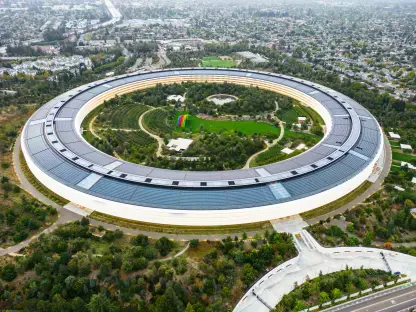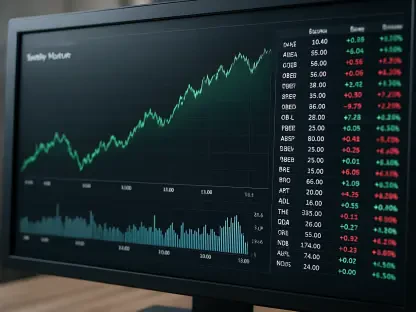The intersection of politics and technology often makes headlines, but perhaps none as compelling as the case of former President Donald Trump’s family and their involvement in the crypto venture, World Liberty Financial (WLF). This ambitious project aimed to revolutionize financial services through decentralized finance (DeFi), bypassing traditional banking systems. Despite raising an extraordinary $550 million, significant progress has been elusive, bringing the venture and its prominent backers under intense scrutiny.
World Liberty Financial: A New DeFi Ambition
World Liberty Financial emerged with the lofty goal of democratizing financial services. By leveraging cryptocurrencies, the platform seeks to offer access to financial mechanisms without the dependency on traditional intermediaries like banks. The concept itself embodied the essence of decentralized finance, promising more control and autonomy to individual users. The timing of its launch was opportune, coinciding with growing distrust in conventional banking systems and an increasing appetite for digital currency innovations.
Investor interest in WLF surged particularly after the 2020 election, creating a fervor that enabled rapid fundraising. This was buoyed by expectations that the involvement of Trump’s family would lend credibility and attract more capital. The colossal influx of funds indicated strong market confidence, yet, ironically, also set the stage for heightened skepticism and speculative curiosity about the project’s future.
Rise of $WLFI Governance Tokens
Central to WLF’s model was the introduction of $WLFI governance tokens. These tokens were designed to empower investors, allowing them to vote on the project’s direction and potential changes to its underlying code. In theory, this should have enabled a democratic approach to decision-making within the community. However, the tokens carried a unique caveat—they were non-tradable.
The non-tradable nature of these tokens posed a significant concern. Investors who might have been keen on liquidity found themselves unable to realize any tangible returns or exit from their positions. This raised questions about the true economic benefits of holding $WLFI tokens and their actual value proposition. The atypical feature of these tokens ultimately became a point of contention among potential and existing investors alike.
Trump’s Family Seizes Control
In a significant development that followed in January, the Trump family firmly took control of World Liberty Financial by acquiring a 60% stake. This acquisition allowed them to claim a major share of the revenues, which seemed poised to ensure that a substantial portion of the capital raised would flow back into the family’s hands. Estimates suggested they stood to collect approximately $400 million in various fees, underscoring the profitability of their involvement.
While their control promised to bring a considerable financial return to the Trump family, it also meant that only a small fraction of the raised funds would be allocated toward the actual development of the WLF platform. This financial structure sparked concern about the venture’s genuine commitment to innovation in the DeFi space and raised allegations of potential conflicts of interest.
Financial Implications and Expert Opinions
The governance structure dominated by the Trump family and other select private investors further fueled skepticism. Financial experts voiced concerns that such a model could undermine the spirit of decentralized finance, which ideally thrives on fairness and inclusivity. Renowned academics from institutions like Georgetown University and Marquette University highlighted the possible exclusion of public investors from meaningful financial participation, thereby questioning the alignment of WLF’s structure with typical DeFi principles.
The disproportionate allocation of proceeds raised unsettling doubts among industry watchers about the overall viability and ethical grounding of the platform. Rather than fostering a true decentralized ecosystem, the concentrated control by the Trump family suggested a veering towards centralization, which stands in stark contrast to the foundational tenets of DeFi.
Attempted Distancing from Conflicts of Interest
In an attempt to mitigate growing concerns regarding potential conflicts of interest, the Trump Organization clarified the family’s strategic positioning. They emphasized that the former president’s investments and business interests were to be held in a trust managed by his children, ensuring a perceived separation from daily operations. This arrangement was intended to allay fears of any direct conflicts or undue presidential influence over the venture’s activities.
Despite these assurances, the overlapping spheres of political influence and financial interests continued to elicit controversy. The optics of the arrangement, combined with the ambitious goals of the WLF, perpetuated a narrative of mistrust and heightened scrutiny. Critics remained wary of the true extent of the former president’s disengagement from the project’s operational intricacies.
Origin Story of World Liberty
Tracing the journey of World Liberty Financial reveals its origin story rooted in the innovation ambitions of two crypto entrepreneurs, Zak Folkman and Chase Herro. These individuals managed to forge strategic connections with the Trump family through notable New York real estate magnate Steve Witkoff. It was Witkoff’s introduction that served as the catalyst, facilitating meetings and discussions that eventually brought the Trump family aboard this ambitious venture.
Despite Folkman and Herro’s less-than-perfect business histories, their entry into Trump circles proved pivotal. The alignment of interests and the subsequent partnership underscored the significance of strategic networking in birthing new ventures, particularly in the high-stakes world of cryptocurrency and blockchain initiatives.
Asian Involvement: The Justin Sun Factor
A major turning point in World Liberty’s journey came with the involvement of Asian crypto entrepreneur, Justin Sun. Initially struggling to overcome resistance in token sales, WLF witnessed a reversal of fortunes as Sun’s significant investment bolstered its position. His participation provided the much-needed momentum to push the project forward, shoring up confidence among other potential investors.
Sun’s involvement wasn’t just financial but also strategic. He soon became an influential figure guiding WLF’s path, although his history with the SEC added layers of complexity to the partnership. The legal challenges Sun faced with the SEC were suspended during this period, which only added intrigue and speculation about the dynamics at play within World Liberty Financial.
Contrast with Traditional DeFi Models
A closer look at World Liberty Financial reveals a glaring contrast with traditional DeFi models. Unlike its peers who champion decentralized governance and community-driven profit-sharing, WLF’s structure remains highly centralized. This centralization restricts governance token holders from participating in profit-sharing or making substantive amendments to essential contracts, particularly those involving high-profile stakeholders like the Trump family.
This divergence from established DeFi norms highlights the unique yet controversial governance style adopted by World Liberty. The potential benefits and pitfalls of such a centralized approach within a decentralized finance context remain points of debate among industry analysts.
Stalled Development and Technical Partnerships
Despite initial expectations and significant capital backing, World Liberty Financial’s practical advancements have been slow. Key developmental milestones remain unmet, underscoring the challenges inherent in moving from vision to execution. Strategic collaborations, such as the one with Ondo Finance, have been announced with much fanfare. However, these partnerships have yet to deliver concrete results, reflecting a slower-than-anticipated progression.
The cooperation with Ondo Finance, aimed at advancing the adoption of tokenized assets, represents a critical partnership meant to bolster WLF’s technical capabilities. Yet, cybersecurity audits and other assessments point to the enduring gaps in the platform’s readiness and operational maturity. This developmental lag continues to fuel skepticism about WLF’s operational effectiveness and technical soundness.
Concerns and Skepticism
World Liberty Financial, under the aegis of the Trump family, has sparked widespread skepticism. The intersection of political influence, financial stakes, and centralized control has raised numerous concerns. Critics question the venture’s ability to truly democratize financial systems given its current structure and governance approach. The project’s seemingly conflicting interests and opaque operational policies further amplify doubts about its long-term potential.
While the venture promises innovative advancements in DeFi, its operational integrity remains a matter of intense debate. The substantial backing and high-profile partnerships have not been enough to quell concerns around potential conflicts of interest and the true beneficiaries of the raised funds.
Future Outlook for World Liberty
The intersection of politics and technology frequently garners attention, but few stories are as intriguing as the Trump family’s involvement in the crypto project, World Liberty Financial (WLF). This venture, with lofty ambitions, sought to revolutionize financial services using decentralized finance (DeFi), effectively circumventing traditional banking systems. The project managed to raise a staggering $550 million, a testament to its ambitious goals and the influence of its high-profile backers.
However, despite this impressive fundraising feat, the project has faced significant challenges in making tangible progress. This lack of advancement has brought WLF and its notable supporters under rigorous scrutiny. Critics and observers alike are questioning the feasibility and direction of the venture, given its high-profile nature and the considerable amount of capital involved.
The involvement of former President Donald Trump’s family adds another layer of complexity to the narrative. Their participation has not only drawn further public interest but also intensified the critical examination of the project’s operations and objectives. As WLF continues to navigate these hurdles, the unfolding story serves as a compelling example of the complex interplay between innovation, financial ambitions, and political influence in the rapidly evolving world of technology.









